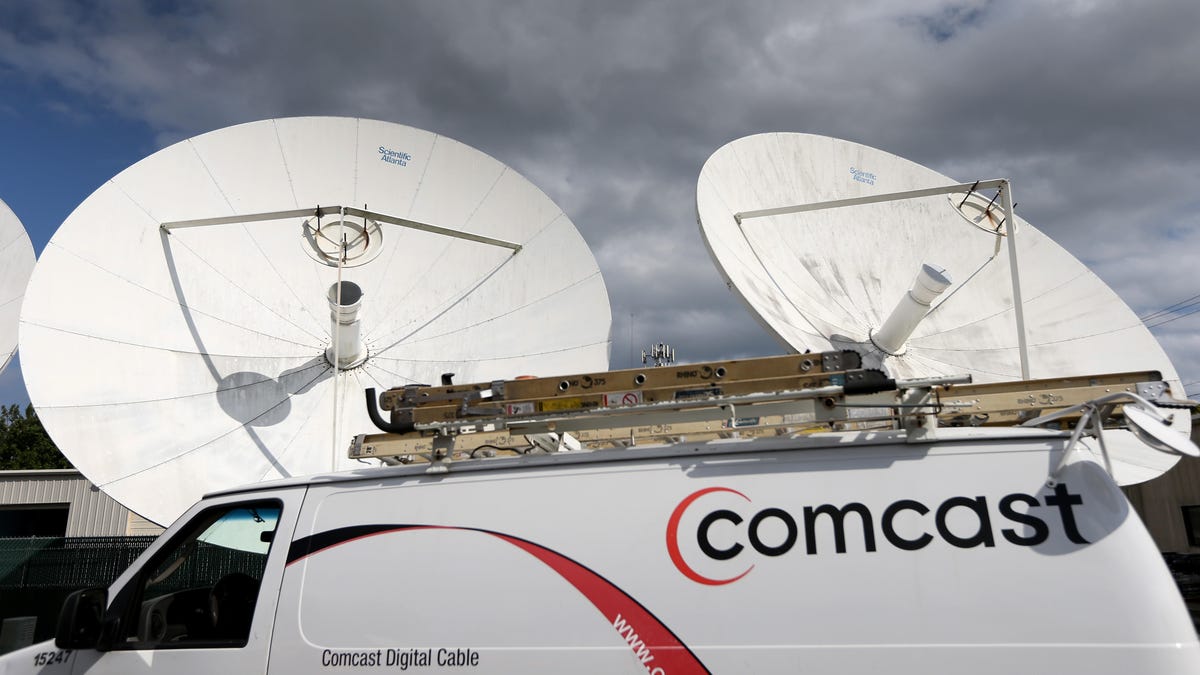Comcast's Internet Essentials delivers low-cost broadband to people with disabilities
People with disabilities are less likely to be online than any other group. Comcast is trying to change that.

Comcast has expanded the eligibility requirements for its Internet Essentials program to allow all low-income individuals, including those with disabilities, to get broadband for $10 a month.
Johnnette Hill, who is 52 and has an intellectual disability, made her first foray onto the internet this summer when she learned how to use Amazon's Alexa to search online for sports scores of her favorite teams.
Hill is participating in a technology coaching program, through the advocacy group The Arc of Philadelphia, to get hands-on instruction on how to use readily available consumer products, such as digital assistants and other connected home devices like the Ring doorbell, to learn how to live more independently.
Those technologies offer a way for Hill and others with disabilities to handle everyday tasks, from placing phone calls and texting caretakers to unlocking front doors and ordering groceries. But while much potential exists in these connected devices, there's an underlying necessity: an affordable home broadband connection.
Johnnette Hill, who has an intellectual disability, learned how to use Alexa and other smart home technology with the help of her tech coach, Shane Janick from The Arc of Philadelphia.
Of the more than 56 million people in the US who have a disability, many haven't been able to afford service or have lacked the digital training to access the internet. The result is that Americans with disabilities are three times more likely than those without a disability to say they never go online, according to the Pew Research Center. When compared with those who don't have a disability, disabled adults are roughly 20 percentage points less likely to say they subscribe to home broadband and own a traditional computer, a smartphone or a tablet.
What this means for people with disabilities is that they often miss out on the benefits and opportunities that high-speed internet connectivity affords the rest of the population. This includes losing out on educational and employment opportunities. And it means not being able to take advantage of medical advances, like access to remote monitoring or other advances in health care because they do not have access to the internet.
That's where Comcast's expansion of its Internet Essentials program comes in. The program, which was introduced eight years ago to help children who receive free or reduced-price lunches at school get access to the internet at home, has been modified several times over the years to include low-income veterans and people receiving public housing benefits. Last month, Comcast extended eligibility for the $9.95 service to all low-income households in its service area, finally opening it up to people with disabilities who receive benefits such as Social Security and Medicaid.
"We knew from the beginning when we launched the program that we were leaving out a big chunk of adults who don't have children," said David Cohen. "We always knew that we'd have to do something to make sure we could include people with disabilities in the expansion of the program."
Not just about cost
Beyond smart home technology, broadband access enables the potential for independence. Mari Hansen, who is 23 and has an intellectual disability and lives in adult foster care, dreams of one day moving into her own apartment and getting a job at her favorite retailer, Hot Topic.
Mari Hansen, 23, has gained online skills through programs hosted by The Arc of Lane County in Oregon.
For Hansen, access to affordable broadband will be important as she looks to go off on her own. But affordability is just one piece of the puzzle. She's also benefited from several free tech training programs through the Arc of Lane County in Oregon where she lives.
Through these programs, she's learned how to navigate the web and privacy settings on social media sites like Facebook and Instagram to connect to people more safely. Hansen, like many people with disabilities, has struggled with feeling isolated and alone, but she says she's used her internet skills to contact people online, which has helped her feel more connected to her community.
She's also learned important job-searching skills and is in the process of looking for employment.
"I've already had four job interviews from jobs I applied to online," she said.
Internet Essentials works with dozens of nonprofits throughout the country that provide free digital training to help provide the digital literacy needed to get people to utilize the program.
As part of its rollout, Comcast announced last week that it's pouring more funding into grants for organizations like the American Association for People with Disabilities and The Arc.
Cohen said these partnerships are important for breaking down the barriers to broadband adoption that are unique to this population.
"The first step is to address digital literacy issues and facilitate digital skills development," he said.
Maria Town, president and CEO of AAPD, said she appreciates Comcast stepping up its efforts to include the disability community in the Internet Essentials program.
"Having an Internet connection at home is absolutely vital for low-income people living with disabilities," she said. "This will help us advance our mission to provide equal access, integration and full inclusion for Americans with disabilities."
For her part, Hill is now recruiting friends in her community to get trained on how to use the internet and to sign up for Internet Essentials.
"She's our top recruiter," said Shane Janick, her tech coach at The Arc.

